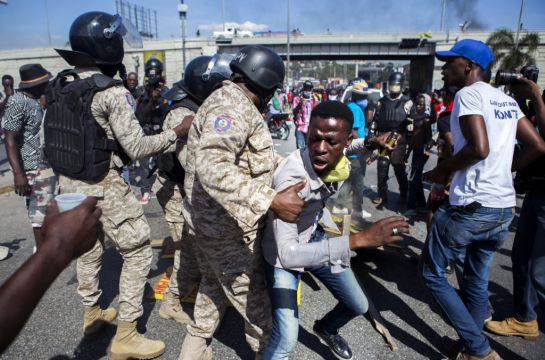Haiti braced for a fresh round of widespread protests starting on Friday, with opposition leaders demanding that President Jovenel Moise step down next month amid worries he is amassing too much power.
“The priority right now is to put in place another economic, social and political system,” Andre Michel, of the opposition coalition Democratic and Popular Sector, said by phone.
“It is clear that Moise is hanging on to power.”
Hundreds of people in Port-au-Prince, Cap-Haitien, Jacmel, Saint-Marc and Gonaives marched in support of the opposition, with dozens of demonstrators briefly clashing with police in the capital although the protests remained largely peaceful.
Opposition leaders are demanding Mr Moise’s resignation and legislative elections to restart a Parliament dissolved a year ago.

They claim that Mr Moise’s five-year term is legally ending — that it began when former President Michel Martelly’s term expired in February 2016.
But Mr Moise maintains his term began when he actually took office in early 2017, an inauguration delayed by a chaotic election process that forced the appointment of a provisional president to serve during a year-long gap.
Haiti’s international backers have echoed some of the opposition’s concerns, calling for parliamentary elections as soon as possible.
They were originally scheduled for October 2019 but were delayed by political gridlock and protests that paralysed much of the country, forcing schools, businesses and several government offices to close for weeks at a time.
Some in the international community also condemned several of Mr Moise’s decrees.
One of those limited the powers of a court that audits government contracts and had accused Mr Moise and other officials of embezzlement and fraud involving a Venezuelan program which provided cheap oil. Mr Moise and others have rejected those accusations.
Mr Moise also decreed that acts such as robbery, arson and blocking public roads — a common ploy during protests — would be classed as terrorism and subject to heavy penalties. He also created an intelligence agency that answers only to the president.

The Core Group, which includes officials from the United Nations, US, Canada and France, questioned those moves.
“The decree creating the National Intelligence Agency gives the agents of this institution quasi-immunity, thus opening up the possibility of abuse,” the group said in a recent statement.
“These two presidential decrees, issued in areas that fall within the competence of a Parliament, do not seem to conform to certain fundamental principles of democracy, the rule of law, and the civil and political rights of citizens.”
Mr Moise has dismissed such concerns and vowed to move forward at his own pace.
In a New Year’s tweet, he called 2021 “a very important year for the future of the country”.
He has called for a constitutional referendum in April followed by parliamentary and presidential elections in September, with runoffs scheduled for November.
“There is no doubt elections will happen,” foreign minister Claude Joseph told The Associated Press, rejecting calls that Mr Moise step down in February.
“Haiti cannot afford another transition. We need to let democracy work the way it should.”
Mr Joseph said Mr Moise remains open to dialogue and is ready to meet anytime with opposition leaders to solve the political stalemate.
He also said the constitutional referendum will not give Mr Moise more power but said changes are needed to the 1987 document.
“It is a source of instability. It does not have checks and balances. It gives extraordinary power to the Parliament that abuses this power over and over,” Mr Joseph said.

“It is not the president’s own personal project. It’s a national project.”
While officials have not released details of the referendum, one of the members of the consulting committee, Louis Naud Pierre, told radio station Magik9 last week that proposals include creating a unicameral Parliament to replace the current Senate and Chamber of Deputies, extending parliamentary terms and giving Haitians who live abroad more power.
The nation of more than 11 million people has grown increasingly unstable under Mr Moise, who received more than 50% of the vote but with only 21% voter turnout.
Mr Moise has faced numerous calls for resignation since taking office, with protests roiling Haiti since late 2017.
The demonstrations have been fuelled largely by demands for better living conditions and anger over crime, corruption allegations and price increases after the government ended fuel subsidies.
The most violent protests occurred in 2019, with dozens killed, and some worry about even more violence as the opposition steps up its demands that Mr Moise resign amid fears that elections will be delayed once more.







